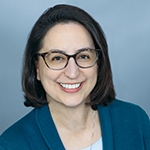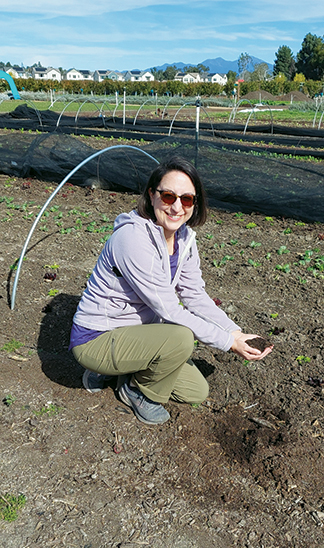Sr. Sara Tarango, also known as "Sister Soil," is all about working from the ground up. She joined Providence St. Joseph Health's environmental stewardship department last year as environmental stewardship liaison for southern California.
Sr. Tarango is a Sister of St. Joseph of Orange, a congregation she joined nearly five years ago after a career in the wine and hotel industries.

She says her life changed after watching a documentary about soil health called Kiss the Ground, a collaboration from the nonprofit by the same name. The film is available on Netflix, and a follow-up film, Common Ground, was released in theaters last fall.
Catholic Health World spoke with Sr. Tarango, who lives in Santa Ana, California, about her career, her vocational path and how soil health affects the health of people. Responses have been edited for length and clarity.
What does your job entail?
Every day is different. It is partnering with our 11 hospital ministries (in our region), and some of them have green teams that were already in existence. Unfortunately, the pandemic stopped a lot of green
team momentum. All of our southern California ministries are either relaunching or rebooting their green teams (a group of caregivers who are committed to helping the organization be more environmentally sustainable). Working for Providence's Environmental
Stewardship team, I can see what's happening at the system level from Alaska to Texas in terms of environmental stewardship. I can connect people from one ministry to the other. I can talk about projects that are happening and once we have the data,
hopefully, we can roll this out systemwide if it's effective.

Tell us more about your background and how that may have paved the way for your position now.
I majored in Spanish and Latin American studies with a minor in international relations. I got a job teaching, and I loved it. I just felt
that this wasn't where God was calling me to be for a career for the rest of my life. I went back to school in Santa Rosa, California, and started studying business. That's how my resume made it to the desk of an HR manager at Kendall-Jackson (winery).
I thought I would work in finance because I like numbers. But I realized quickly working in finance that the higher up you go, the more it's just you and your computer. I needed people.
A very savvy HR manager called me one day and said, "Are you bilingual?" I said, "Yes," and she said, "Would you help us out with our hiring for the harvest season?" I'm in my early 20s. I'm like, "Yeah, sure." From that position, I realized my passion for human resources. What I loved about that job was I was serving people. I saw that as a way to serve, from the CEO down to management down to the vineyard worker.
I enjoyed that for many, many years before entering religious life. However, I knew, again, that feeling like God's calling me to work somewhere else. I took a class on the Pope's encyclical "Laudato si': On Care for Our Common Home." That's how I found Kiss the Ground, the organization from the movie. That movie changed my life.
What struck you about the movie?
After I saw that movie, it made sense from a scientific standpoint. But for me, there was the larger spiritual message in it as well, when the earth was dry and devoid of life, that microorganisms
in the soil and regenerating kind of breathed life back into it. That's what God does for us when we're spiritually dry and devoid of life. Many people on podcasts who talk about regenerative agriculture will say that there is a spiritual component
to it. I can go back to Genesis as well, the first chapter in the Bible, to Adam, which means "soil creature," and "remember you are dust and to dust you shall return." We have this connection with the land that is so primal. It's part of who we are.
Can you explain why soil health is so important for the health of the rest of the environment and for people?
I have a T-shirt with a quote from J.I. Rodale, the founder of the Rodale Institute: "Healthy soil equals healthy food equals healthy people." If you don't have healthy soil, if you don't have nutrient-rich, microorganism-rich soil, how can you give anything to the plant? We are eating
foods right now that are so devoid of nutrients, yet they look like foods that we're used to eating.
How did the soil get unhealthy in the first place?
There are multiple ways. I would say the two main ways are all of the synthetic inputs that we're putting into our soils, anything that ends in "cide": herbicide, pesticide, fungicide,
insecticide. All of those are killing the life within the soil. And heavy tilling as well — we always thought that was what you do, until you see it over a long period of time. But that disturbance of the soil also harms the life within the
soil. Part of the regenerative model (of agriculture) is to go low till or no till if you can get away with it, but a lot of places can't.
How do you connect soil health to the hospital world?
Providence has a framework called WE ACT.
It's a mnemonic. The "W" is waste, the "E" is energy and water, the "A" is agriculture and food, the "C" is chemicals, and the "T" is transportation. My favorite letter, sorry, I'm biased, is the agriculture and food. We have a third party that provides
food at most of our hospitals. We are looking at food that is not full of chemicals or ultra-processed, that doesn't come from the field. When we look at our foods, we are looking at foods with a lower carbon footprint. Where do they come from? Are
they sustainably grown? Are they grown near or far? The chefs can actually make choices that will lower the carbon impact.
Thanks to SB 1383 (California's law to help reduce waste and promote sustainability), all of our hospitals in California are composting, keeping the leftovers of the waste out of the landfill, where it can produce methane. There is software and technology that measures your waste and if you have a whole bunch of, say, sausages leftover from breakfast, it'll recommend a recipe that includes those sausages for lunch or dinner. There's food donation programs, again, part of SB 1383. All our hospitals are partnering with local organizations, and thankfully, because of the legislation, there's a lot of them sprouting up where we can get food into the hands of people who really need to eat it. And to me, that's the completion of the circle, because we talk about caring for the poor and vulnerable. This is feeding the poor and vulnerable, and many times as well.
Tell us more about your decision to enter religious life.
I was working in human resources for a hotel and living in San Diego at the time. I love going on retreats, and while on retreat several years ago, I met our sisters, who
served as spiritual directors. The first night you can speak to the other retreatants and I hit it off with one of our sisters. On that retreat and a few days before that retreat, three people who don't know each other, and two of them who didn't
really know me at all, asked me the same question: Have you ever considered religious life? I thought, no, no, no.
Anyway, I ignored it for a year. That's how stubborn I am. But the question and the amazing coincidence was just in the back of my mind the whole time, and I thought, OK, if I'm going to say no, I'm going to say no because I actually looked into this and didn't base it on preconceived ideas of what you see in media and television. And so I called the sister that I met, and I said, "Does your congregation have anything for a young woman who is looking into religious life?" Of course they do. I'm on that vocation team now.
So when I met our sisters, I felt like, yes, yes, yes. Yes, our spirituality was very similar. Yes, the way we lived our lives, very simply, was very similar. And from an HR standpoint, I thought, this is a great fit. So I continued to pray and I discerned for another year. And it was like, yes, this is where God's calling me, and I have never looked back.
Where did the nickname Sister Soil come from?
We were in a meeting of all of our sisters, and it was right after the pandemic. We're all wearing masks, but we're finally together, and I'm just going off on soil. And one of the sisters
stopped and was like, "Hey, you need to come over here. Listen to Sister Soil." I loved it.
Soil is amazing. In a handful of soil, there are more microorganisms than there are people on the Earth. One of my Earth Day presentations to our staff last year was all about listening to the soil. There's a group that does bioacoustics, where they can stick prods down into the soil and you can hear it.
It's just showing people that underneath your feet there's a whole other world going on you just might not be aware of.
That's part of building the awareness and making the connection of healthy soil, healthy food and then healthy people.
